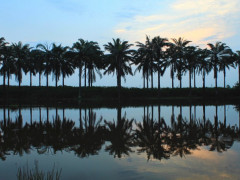Talang Tuwo Inscription, Local Wisdom Protects Peat Ecosystem (1)
By Parliza HendrawanObserving the Central Kalimantan Governor Candidates’ Partiality for the Environment
In the 2020 political contest, governor candidate number 1 and number 2 have not spoken explicitly and unequivocally regarding the protected areas, which includes forests, peatlands, and the protection of the community-managed areas. Both of them are only focusing on pushing investment schemes into Central Kalimantan, protecting the existing permits, and matters related to local revenue (PAD) and economic interest, hence nothing is firm in terms of the vision and mission. This is also reflected in several public debates.
On the other hand, with regards to indigenous peoples, which has become a topic of discussion at the national level, namely in relation to the conflicts that occurred in several areas including Kinipan. Candidate number 1 and number 2 only brought up this topic to gain momentum. The indigenous people and indigenous communities have not been acknowledged in Central Kalimantan, one of the candidates is trying to raise this issue, but they seem to only want to discuss it and not take any actions. The two governor candidates said that it was necessary to protect the indigenous peoples, but they offer no concrete protection scheme nor provide adequate elaboration. Therefore, no strategic steps have been taken about the vision and mission of these two candidates. There is no clarity when it comes to issues related to environmental issues, indigenous peoples, evaluation of environmental conditions, and environmental audits.
The candidates’ priority is to try and push investment into the province and improving infrastructure development. This is must be clearly observed, whose interests are driving these candidates?
The fact is that the Central Kalimantan environmental conditions are currently very critical, its capacity and carrying capacity are already at a breaking point. This year alone, there have been 3-4 major floods and flash floods in a number of districts. With regards to the Central Kalimantan fires, we are lucky this year, a fairly high intensity of rain results in a wet-dry season, but one of the aftermaths is flooding.
On the other hand, environmental protection and supervision remain minimal. This is reflected seen from the large-scale land clearing activities in Central Kalimantan. One example is the illegal logging in Tumbang Manggu, Katingan, in which a large-scale logging activity is taking place. This has been going on for quite a long time, for almost 2-3 years.
In the future, land clearing will reoccur for the sake of food production. The former PLG, which is an area with peat domes, has not yet been completed, and now a 50-hectare forest area in Gunung Mas District has been cleared to be used for food production with cassava as its main commodity. This is in line with the recently issued Minister of Environment and Forestry Decree Number 24/MENLHK/SETJEN/KUM.1/10/2020 concerning the provision of forest areas for food estates and allows the creation of food sector or food estates in forest areas, including protected forests, which will worsen the condition in Central Kalimantan.
Unfortunately, the Central Kalimantan regional head candidates are not seriously conducting studies or criticizing the central government’s policies, lest these policies resulted in harm to the region. In such a case, the local government will be the target of public protest, not the central government. These kinds of issues should be considered by the two candidates, namely, how would they criticize the national policies, including criticizing the food estate policy itself.
The above-mentioned issue occurred because of local political dynamics, in which local businessmen came up and dominated the political stage after the end of the New Order era. This is marked by the emergence of predatory oligarchy in a number of areas with rich natural resource potential. The political and economic power controlled by these oligarchs has created inequality in social and economic development, injustice, underdevelopment, and horizontal conflict (Aspinall, 2003). The persistence of this oligarchic behavior is due to the institutional framework of power that is alive and maintained by the political-economic elite. In other words, the changes in the authority institutions are not accompanied by fundamental changes in the power relations structure and the behavior of political actors (Robison and Hadiz, 2004).
Oligarchy is not only limited to the minority ruling over the majority, but rather the politics of defending wealth and power. The main principle of oligarchy is to produce material inequality to create political power inequality (Winters, 2011). Although the position and access to the political process (electoral) are considered to be equal in a democracy, the enormous wealth in the hands of a small minority ultimately creates significant political power. Elections have an immense influence on power, especially in a democratic system.
The involvement of a number of coal mining entrepreneurs in the Central and South Kalimantan local elections is evident in an article written by Aspinall and As'ad (2013) entitled Local Election: Mining and Local Bossism in South Kalimantan and Central Kalimantan. This study reveals the involvement of a number of mining entrepreneurs who act as political brokers in the local election. They are hoping to obtain political rewards from the entrepreneurs who are elected in the local election, particularly rewards related to the management of local economic resources or infrastructure projects. As a result, the policies issued after the election tends to favor their political patronage.
The ideal leader for Central Kalimantan, amidst an environmental crisis, should be brave enough to create pro-community and pro-environment policies, by encouraging environmental evaluation and audits, law enforcement, and maximizing the utilization of local assets for the local communities and indigenous peoples’ interests. This drive must be strengthened by policies that are in accordance with the conditions in Central Kalimantan and its community.
Central Kalimantan has a total land area of 15.3 million hectares and 80 percent of it has received investment. This has resulted in many inequalities in the community-managed areas, where the rights of the people who have managed their territory for generations are neglected and they were evicted due to incoming investment. This happened without the consent or even the knowledge of the community.
Central Kalimantan needs courageous leaders who can say “Stop the investments, for the time being, evaluate the existing permits, stop all permit processes, conduct environmental audits, and enforce the law". Large areas in Central Kalimantan have been completely destroyed, but the local revenue remains low. The current management of natural resources requires improvement.
Public awareness about the environment and about electing environmentally aware leaders have started to increase. The community is already aware and knows which leaders are really fighting for their (community) interests and which leaders only ask for their votes every five years.
It's just a matter of how the Central Kalimantan future leaders can eliminate the political kickback culture, in order to eliminate political patronage that can disrupt the current democratic process. On the other hand, pushing for transparency regarding the development process and welcoming criticism is a strategic step that the government can take to maintain its accountability in the regions. (*)
*The author is an environmentalist and is a member of Simpul Jaringan Pantau Gambut - Central Kalimantan
** THIS ARTICLE WAS PREVIOUSLY PUBLISHED IN KALTENG POST (PAGE 12) ON 8 DECEMBER 2020 AND KALTENG NEWS PORTAL ON THE SAME DATE **




